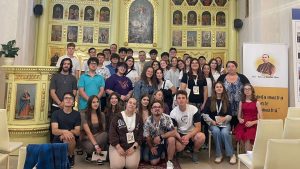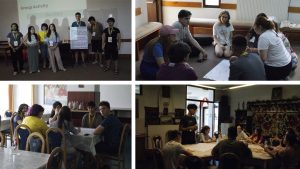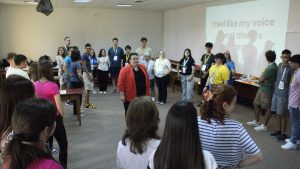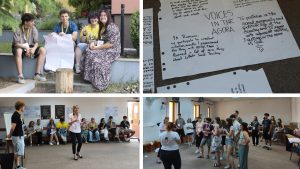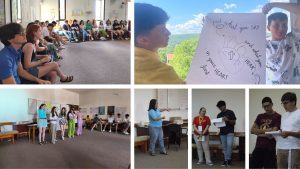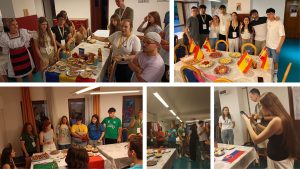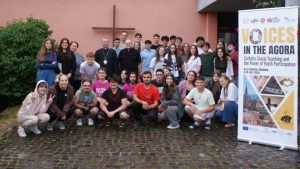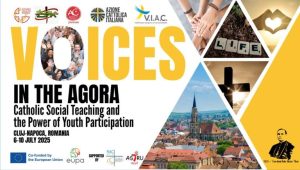VOICES IN THE AGORA – Catholic Social Teaching and Youth Participation
Cluj-Napoca, Romania | 6–10 July 2025
When young people become living voices in the agora: an experience of formation, communion, and mission for the common good
Between 6–10 July 2025, the city of Cluj-Napoca hosted the international event VOICES IN THE AGORA – Catholic Social Teaching and the Power of Youth Participation, a training program for young people aged 16 to 25 from Romania, Italy, Spain, Malta, and Slovakia. Organized by Catholic Action Romania (ACRO), the event was co-funded by the European Union through the Erasmus+ program and supported by the Catholic Action Forum and partner organizations from the five countries.
The meeting took place within the framework of the Year of “Cardinal Iuliu Hossu” and was hosted by the Manresa Center in Cluj-Napoca, a Jesuit space dedicated to spiritual formation, dialogue, and reflection, which provided the ideal setting for the program’s activities.
A simple question with profound answers: What is Catholic Social Teaching, really?
From the very first day, participants were invited to embark on a shared journey of discovery into one of the Church’s greatest treasures: its social teaching. What does it mean in daily life? Where does it begin? How is it lived out?
As the discussions evolved, many were surprised to realize that the core principles—human dignity, the common good, solidarity, and subsidiarity—were already familiar to them. In fact, they had been living them, intuitively, through their involvement in the community, in youth groups, and in local projects.
Catholic Social Teaching no longer seemed like an abstract concept, but a living reality, already present in their daily choices and values.
Monday, 7 July 2025 – The Right to Speak
Monday focused on one of the fundamental needs of the human being: VOICE. To be heard. To be recognized. To know that you have the right – but also the responsibility – to express yourself. The theme of the day, “The Right to Speak,” provided the ideal framework for young participants to reflect on democratic participation in the light of Christian values.
The program began with a warm and interactive welcome session, facilitated by Codruța Fernea, President of Catholic Action Romania. Through icebreakers and symbolic activities gathered under the title “Symbols of Our Voice”, each participant was encouraged to express their identity and values through a personal object. A walk in pairs helped them get to know one another beyond nationality or language, creating an atmosphere of trust and openness.
In the second part of the morning, Raluca Istoan, former president of ASTRU Cluj, led an interactive session entitled “Map Your Voice – Local Challenges, Global Context.” Starting from personal reflections and provocative statements, participants were invited to analyze the social realities in their own communities and connect them with global issues such as inequality, discrimination, or lack of civic engagement. The session stimulated critical thinking and opened the path toward an honest dialogue about the challenges faced by their generation.
The afternoon brought into focus an essential theme: democracy lived out. Camilla and Liviu Bocănială, founders of the Polylogos Association, guided a powerful workshop on civic rights, roles, and responsibilities. Using participatory methods, role-playing, and self-awareness exercises, the young people were challenged to define their personal values and discover how they can become active citizens—conscious and coherent with their faith. Discussions touched on sensitive topics such as marginalization, silence in the face of injustice, and the choice to be a witness or an actor.
The evening was dedicated to celebrating diversity – a true “cultural agora” where each national group presented aspects of its own culture: traditional dances, games, snacks, and songs that speak of identity, family, and festivity. It was more than a party: it was a living lesson in fraternity. In a world often divided, the young people showed that differences do not separate – they enrich, when lived with respect and openness.
This day helped participants discover that speaking in the public space does not mean simply raising your voice, but having the courage to be authentic, to listen, and to build bridges. It was a day about dignity, dialogue, and identity – lived, not just taught.
Tuesday, 8 July 2025 – The Duty to Dialogue
The second day of the training was dedicated to one of the most challenging and urgent topics in today’s society: dialogue. In a world increasingly polarized, where voices often overlap without truly listening, the young participants were invited to rediscover the value of authentic dialogue – not as debate or confrontation, but as encounter.
The morning began with a deep and interactive session led by Alexandrina Kiss, trainer and national advisor for the adult sector within Catholic Action Romania. Starting from key excerpts of the Fratelli Tutti encyclical, the young people reflected on how conflicts arise and the concrete steps that can transform tension into healing conversation. The discussions were complemented by visual and symbolic activities: each team created a poster on the theme “The Culture of Encounter”, expressing through color, words, and symbols what a society that truly embraces encounter looks like – beyond stereotypes and fear.
After lunch, Bogdan Cîmpean, seminarian of the Eparchy of Cluj-Gherla and a student active in youth ministry, introduced the participants to the coherent and deeply human world of Catholic Social Teaching. Using accessible language, rooted in their reality, he explained the core concepts of human dignity, the common good, solidarity, and subsidiarity, emphasizing the link between faith and concrete involvement in community life. In small groups, the young people analyzed the social actions they are already engaged in and identified new ways they could bring about change – even through small but meaningful gestures. They were also encouraged to use DOCAT – a user-friendly guide adapted for the younger generation that explains the social values of the Gospel – not just as study material, but as a tool for discernment and action in everyday life.
The evening brought a shift in rhythm, but not in depth. After a day full of ideas and reflection, the participants stepped into a space where silence, song, and light spoke more than words: the Byzantine Divine Liturgy, celebrated by Fr. Titus Sas at the Greek-Catholic Church of Bob. For many of the young people present, this was their first encounter with the Eastern liturgical tradition – an experience that opened a new horizon of the Catholic Church’s universality and spiritual richness. The Liturgy, with its melodic chants, sacred gestures, and light-filled iconography, created an atmosphere of deep recollection. Prayers rose in a different tempo – slower, more contemplative – giving each person interior space to contemplate, listen, and receive.
The place itself enhanced the experience: Bob Church, built at the beginning of the 19th century, is not only the oldest Greek-Catholic church in Cluj-Napoca but also a space of living memory, deeply connected to Blessed Iuliu Hossu.
To celebrate the Byzantine Liturgy in this place – as young people coming from five European countries – was a gesture of communion with history, with the martyrs, with the identity of a Church that has known how to resist through faith and sacrifice.
In a modern and diverse European city, this encounter with the roots of faith was a lesson in coherence, patience, and spiritual beauty.
After the liturgy, a themed walking tour guided the participants through the center of Cluj, following the path of Iuliu Hossu’s life – a living lesson in history, faith, and courage. The walk helped them understand more deeply what it means to witness through your life, even in times of darkness.
The evening concluded with dinner in the city, followed by a moment of quiet personal reflection and prayer.
It was a day in which dialogue was lived – between cultures, between traditions, between generations.
Wednesday, 9 July 2025 – The Power to Act
The third day of the Voices in the Agora program was dedicated to action. After two intense days of reflection and dialogue, the participants were invited to take on their own responsibilities in society and the Church — to move from intention to initiative, from ideas to concrete action.
The day began with a session facilitated by Codruța Fernea, president of Catholic Action Romania, who challenged the young people to reflect on the connection between faith, conscience, and civic courage, inspired by the life and witness of Blessed Iuliu Hossu. Through sincere and participatory dialogue, the youth rediscovered the value of making choices in the light of values – not only declared but lived. The reflection focused on five core values: faith, courage, compassion, integrity, and authenticity, not seen as abstract ideals but as guiding lights for real-life decisions. Each participant was invited to choose one value and make a concrete commitment for the near future.
Following this, Camilla and Liviu Bocănială, trainers from the Polylogos Association, led a practical workshop on civic initiative, campaigning, and collaboration with local authorities. Participants explored the necessary steps for turning an idea into a real project: from identifying a need to planning, communicating, and mobilizing resources. It was a hands-on session that provided clear tools and concrete examples of responsible action.
The afternoon was dedicated to the Project Lab – a creative and collaborative space in which participants, organized into international teams, developed mini action plans based on the realities of their communities. Topics ranged from social inclusion to ecology, civic education, and youth participation. At the end, each team presented their idea in plenary with enthusiasm and clarity, proving that a new generation is ready to take on an active role in public life.
A special moment followed: the visit of Bishop Claudiu, the bishop of the Eparchy of Cluj-Gherla. In an atmosphere of emotion and gratitude, participants from each country introduced themselves, giving a living face to the diversity of the gathering.
Then, on behalf of everyone, Assia Imperatore – a participant from Italy – offered a short summary of the shared experience:
“We are voices in the square; we are sons and daughters of God who had the courage to step forward to discover what we have in common, what we can say to one another, how we can speak – as young people, to young people – about the Church and from within the Church. We started with a question: what does Catholic Social Teaching mean?
To our surprise, we discovered we’re already practicing it in our associations without even realizing it. A central moment was dedicated to mutual listening. We rediscovered the importance of recognizing and valuing the voice of the other, knowing that each voice is unique and deserves to be heard. In this sense, dialogue became the heart of our experience. Sharing meals created a warm and informal space that paved the way for genuine cultural exchange. Each group shared their dances, traditions, stories, and music – helping us know each other more deeply and break down barriers.
Another meaningful moment was the visit to the Greek-Catholic Church of Bob, a symbol of faith and history in Cluj. For many of us, it was our first time attending a Greek-Catholic Liturgy – and there, we truly understood what it means to be part of the universal Church.
I believe this journey will leave deep marks in our lives. We shared parts of our personal story. It took courage and trust to tell one another who we are, but that’s what created a deep connection between us. We felt that beyond linguistic and cultural barriers, we are all ‘Fratelli Tutti’ – brothers and sisters in faith.
We, the youth, through dialogue – for Christ, with Christ, and in Christ – can truly make a difference.”
Then followed a response from Bishop Claudiu, who echoed and reinforced all these experiences. He spoke about the mission of the Christian in the world, about the power of witness, and the courage to live faith publicly – just as Blessed Iuliu Hossu had done. He emphasized that young people are not “almost Church,” but already the living Church, and their calling is not for later, but for now. Using examples from the lives of young saints – from St. Bernadette of Fatima to Carlo Acutis – Bishop Claudiu encouraged them to live their vocation without fear, without masks, without delay:
“You don’t need to convince the world – you only need to transmit what God has entrusted to you.
You are not precious for what you will do, but for what you do today.
Go forward, knowing the Lord is working through you.”
He also spoke of the importance of the Christian’s public mission and the value of martyrdom lived with serenity and faithfulness, as in the case of Blessed Iuliu Hossu:
“The Blessed Cardinal was not a man of big words, but of great choices.
He refused to change his faith even when offered freedom and a position of prestige.
He said, ‘If I change my faith, I change my life.’ And his life was always faith.”
The bishop urged the youth to be missionaries of the Gospel in their everyday lives – in schools, communities, and in dialogue with others – not as experts, but as witnesses, through their presence and truth. He ended with a powerful call to perseverance and communion:
“Never lose hope. You are precious in the eyes of the Lord. (…) You are precious not for what you will do, but for what you do today.
This is my invitation: go forward, knowing the Lord works through you.
Before every encounter, always ask – if you have time – for the Lord’s inspiration. Say: ‘Help me to comfort this person. Help me say the right word. Or just help me smile.’
Maybe someone doesn’t even need words or anything else – just to know someone is near them.
I guarantee you: the Lord works through you, just as He worked through the apostles.”
The day concluded with a Holy Mass, celebrated in gratitude for the graces lived together, by Fr. Olivo Bosa SJ and Fr. Cristian Langa, spiritual assistant general of Catholic Action Romania. At the end, Fr. Cristian offered each participant a small gift – a cross pendant – to remind them how much the Lord loves each of them personally, and to carry with them not only the cross of following Christ, but His love, each day.
The evening ended with a session of reflection and evaluation, as well as the distribution of participation certificates.
It was a night of joy and communion: an intercultural party, with dances, games, and flavors from all across Europe – a sign that when values, faith, and initiative meet, they give birth to a living, united community, capable of changing the world from within.
THURSDAY, 10 JULY 2025 – FAREWELL WITH GRATITUDE
The final day of the Voices in the Agora gathering began early, with a shared breakfast and warm farewell hugs. In addition to the support offered by the organizers for transfers and departure logistics, the morning was marked by sincere promises to meet again and the beginning of new international collaborations.
A CLEAR MESSAGE: YOUNG PEOPLE ARE NOT JUST THE FUTURE OF THE CHURCH – THEY ARE ITS LIVING PRESENT
The event in Cluj-Napoca was far more than a training course. It was a deeply synodal experience, a journey of rediscovering one’s own vocation, of encountering the other, and of recognizing the presence of God in community.
For four days, young people from four countries engaged in dialogue, prayer, and mutual learning, exploring what Catholic Social Teaching means in concrete terms – not as theory, but as a life lived in dignity, solidarity, and responsibility.
Through workshops, liturgies, reflections, and moments of intercultural communion, a shared conviction emerged: that young people do not need to be “prepared” to become the Church of tomorrow – they are already a living, engaged, and inspiring part of the Church today.



